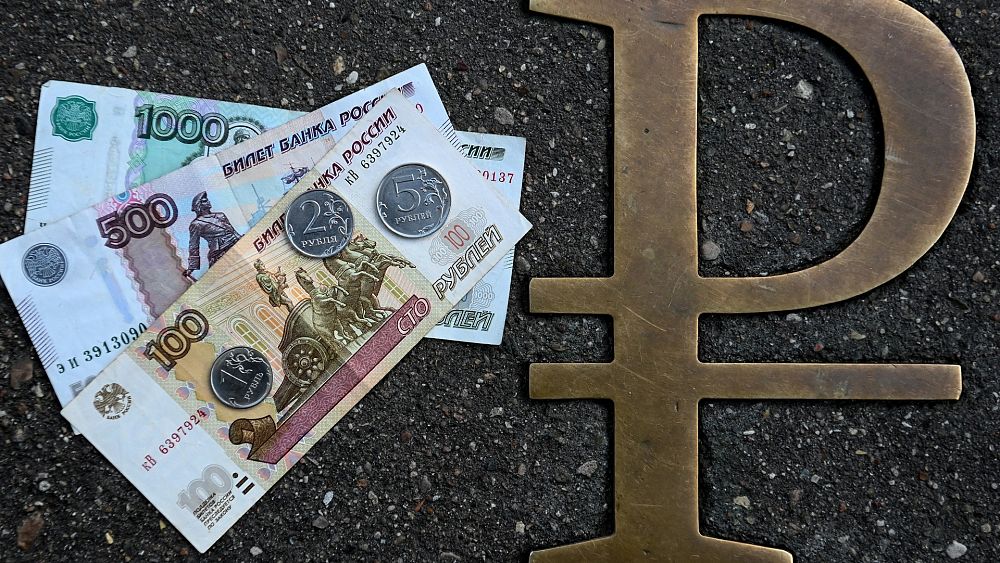
With fears growing that a Russian invasion of Ukraine may be imminent, talk is growing of how the West will respond.
US Secretary of State, Anthony Blinken, has warned of “massive consequences” if Moscow were to invade, but failed to specify what the repercussions would be.
EU foreign ministers met on Monday in Brussels to discuss their own response and were also deliberately vague in what any reaction might look like.
If Putin is to launch an invasion of Ukraine, then there are a range of options on the table for the EU and its allies.
Economic and financial sanctions
Russia has been hit by various rounds of sanctions over the years, each with varying degrees of success. One of the most recent measures being floated is to cut the country off from the SWIFT financial transaction system, which is one of the main parts of the global system for transferring money all over the world.
To cut Russia off from this network is something that would have severe consequences, making it very difficult for anyone inside the country to do any kind of financial transaction with the Western world and also globally.
However, Professor Markus Ziener from the German Marshall Fund of the United States, says it is not as simple as that.
“If they [Russia] would be cut off from SWIFT, this would also hit basically any financial institution in Russia. Now, what’s the caveat?” Ziener told Euronews. “The caveat here is that Russia has amassed hundreds of billions of gold and US dollars. They have a lot of reserves, and they also have close cooperation with China.
“So, there might be a possibility for Russia to circumvent the impact of these sanctions and it’s a controversial kind of thing. We don’t know really how much harm this will do to the Russians.”
But cutting Russia off from SWIFT would also create problems for the EU.
For example, a European company buying Russian gas would not be able to pay by using the system, potentially damaging business.
Nord Stream 2
It is impossible to mention any Western reaction without mentioning the controversial energy project.
The natural gas pipeline, which was completed last September, aims to connect Russian gas via the Baltic Sea with Germany, and thus, Europe.
As things stand though, it is waiting for the green light from German and EU regulators to start providing the continent with much-needed energy supplies.
Its critics argue it weakens European energy independence and can be used as a political tool by Moscow, whereas its supporters say it is needed to enhance EU energy security by increasing supply.
The US has long voiced its concerns at Nord Stream 2, albeit, largely falling on deaf ears.
But a recent signal by German Chancellor Olaf Scholz suggested that Berlin may consider halting the natural gas pipeline in response to an attack on Ukraine.
In a press conference with NATO Secretary-General Jens Stoltenberg last week, Scholz responded to a question on Nord Stream 2, saying that there will be a “high price to pay and that everything will have to be discussed should there be a military intervention in Ukraine”.
Will Western allies find unity over Russia?
Despite all the talk of punishing Putin and presenting a united front, behind the scenes there is very little consensus on how to proceed in the event of an attack.
On the matter of the SWIFT financial transaction system, Ziener says there’s “no clear-cut answer” on this.
“Some European countries are saying, let’s not do that. Let’s do it step by step. Let’s not start with SWIFT right away as one of the most massive sanctions we can do,” the professor told Euronews.
Others want to go the opposite way and hit Russia where hurts financially.
With Nord Stream 2, there are EU-wide divisions in every corner, including in Germany’s own coalition government.
Scholz’s SDP is more cautious of cutting off the project, whereas the two governing partners, the Greens and liberal FDP, would prefer to take a more “values-based” foreign policy.
Berlin has even blocked weaponry deliveries coming from Estonia to Ukraine because there are German components in those weapons, potentially restricting Kyiv’s ability to respond to any attack.
From the outside, it seems like finding agreement between the EU and its allies will be difficult, but for now, a united front is being presented, with the EU’s foreign policy chief stating on Monday that “Our unity is our strength, and there is no doubt…about this.”